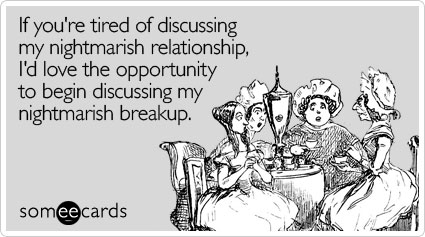All relationships are hard work, whether it be familial, friend, work or romantic relationships. Some are incredibly rewarding and fulfilling, while others feel like eating glass would be a better alternative than continuing. Unfortunately, some relationships are difficult to escape – you can stop talking to one another, but your mother will always be your mother. As I often tell my clients, we cannot control the behavior of others, we can only control our own. While it does take two to make a relationship work, there are things we can do to guarantee that things will get progressively worse.
Here are the 9 best practices to put an expiration date on a relationship:
- Emotionally shutting down/withholding – this could mean many things, including withholding sex, affection, love, attention, commitment, time. There are times in our lives when we just don't have the energy to give what our loved ones need. However, there is a huge difference between distraction or fatigue and punishment. If we are shutting down and withholding because we're upset about something, no one wins. It breeds frustation and resentment and no one will get their needs met.
- Ultimatums – one of the best things about becoming an adult is that we can do whatever we want (at least in theory). When we try to force someone to do what we want them to, it often backfires; what grown person wants to be told what to do? You aren't the boss of me!
- Silent treatment– there are other, more effective ways to communicate our dislike or hurt about someone's behavior, including opening our mouths and sharing them. It can easily turn into a competition of who will break first and the original issue may become burried and remain unaddressed.
- Jealousy/insecurity – these are both valid and common emotions, but become extremely problematic when they lead to wild accusations and undeserved mistrust. Eventually, the unfair accusations may lead to the very behavior we feel jealous or insecure about.
- Bullying/putting down – in any kind of relationship, it is not okay to hit, push, punch, slap, etc. anyone else. Emotional and verbal abuse is not okay either. This includes name-calling, screaming, using aggressive/threatening language, or making someone feel bad about who they are. If you are the victim of any kind of abuse, whether it be physical, emotional, verbal or sexual abuse, please get help.
- Negativity – sometimes it's easy for us to overlook; who doesn't have a bad day sometimes? However, some people revel in negativity and constantly focus on everything that's going wrong, all the time. Beware, as it is quite infectious.
- Lying – whether it be outright lying or lying by omission, this can lead to mistrust, especially if we are caught. This doesn't mean that we have to share everything with everyone all the time, but lying can often bite us in the butt. On the flip side, I do my best not to ask questions I may not want the answer to.
- Double standards – it comes back to the old adage, “Treat others the way you want to be treated.” I once had a partner tell me what applies to me doesn't apply to them, that basically I couldn't hold them to the same standards to which I was being held. That relationship did not work out too well. It is important to hold ourselves to the same expectations we have for our loved ones.
- Being judgmental – we are our own worse critics and do not need anyone else making judgments about our feelings, thoughts, and actions and communicating them without being asked.
Now, no one is perfect. At some time or the other, we've all engaged (or still do) in some of these behaviors. We've also been at the receiving end of some of these behaviors and can understand the feelings they evoke. One of the best things we can do is to keep the lines of communication open in our relationships to help prevent these behaviors from rearing their ugly heads. That means talking about it when it comes up and also being open to hearing about it from someone else. We can only begin to work on issues when we're aware that they exist.

I think the 'Double Standards' section needs an asterisk and a footnote. I know exactly what you mean but some people erroneously reverse this principle and think that their partner should behave like them. They use the golden rule against their partner. Here are some examples:
ReplyDelete*I don't go out with my friends so often, why do you?
*I buy you expensive presents - you should do the same for me.
*I always call you and tell you where I'm going, where I'm at, who I'm with, what I'm wearing and what I'm doing - you should do that too!
LOL!
This is true. Acceptance of differences is key in making a relationship work.
ReplyDelete